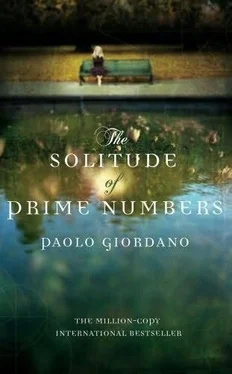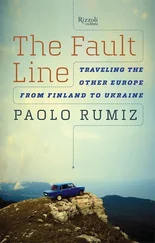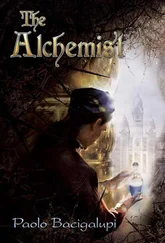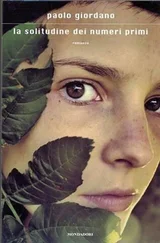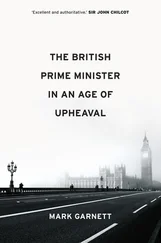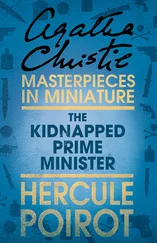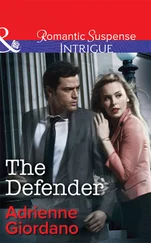As she walked she grazed along the two-tone wall, brushing it with her right shoulder from time to time to avoid touching anyone. Lunchtime visiting hour had just begun and people were pouring into the hospital like a liquid mass.
Aluminum-and-plywood doors opened onto the wards, each with its own particular smell. Oncology smelled of disinfectant and gauze soaked in methylated spirits.
Alice entered her mother's room, which was the second to last. She was sleeping a sleep that wasn't her own and the gadgets to which she was connected didn't make a sound. The light was faint and drowsy. On the bedside table red flowers were arranged in a vase: Soledad had brought them the day before.
Alice rested her hands and the camera on the edge of the bed, where the sheet, lifted in the middle by her mother's outline, flattened out again.
She came every day to do nothing. The nurses already took care of everything. Her role was to talk to her mother, she imagined. Lots of people do that, acting as if the patients were capable of hearing their thoughts, able to understand who was standing there beside them, and conversing with them inside their own heads, as if illness could open up a different channel of perception between people.
It was not something that Alice believed in. She felt alone in that room and that was that. Usually she would just sit there, waiting for half an hour to pass, and then leave. If she met a doctor she asked for news, which was always the same anyway. Their words and raised eyebrows meant we're only waiting for something to go wrong.
That morning, however, she had brought a hairbrush. She took it out of her bag and delicately, making sure not to scratch her face, combed her mother's hair; at least the hair that wasn't squashed against the pillow. She was as inert and as submissive as a doll.
She arranged her mother's arms on top of the sheet, extended and parallel, in a relaxed pose. Another drop of the saline solution in the drip ran down the tube and disappeared into Fernanda's veins.
Alice moved to the end of the bed, resting the Canon on the aluminum bar. She shut her left eye and pressed the other to the viewfinder. She had never photographed her mother before. She pressed the shutter and then leaned a little farther forward, without losing the frame.
A rustling sound startled her and the room suddenly filled with light.
"Better?" said a male voice behind her.
Alice turned around. Beside the window a doctor was busying himself with the cord of the venetian blinds. He was young.
"Yes, thanks," said Alice, a little intimidated.
The doctor stuck his hands in the pockets of his white coat and went on looking at her, as if waiting for her to continue. She leaned forward and snapped again, more or less randomly, as if to please him.
He must think I'm crazy, she said to herself.
Instead the doctor came casually over to her mother's bed. He took a glance at her chart, narrowing his eyes as he read, reducing them to slits. He went over to the drip and moved a wheel with his thumb. The drops started to come down more quickly and he watched them with satisfaction. Alice thought there was something reassuring about his movements.
The doctor came over to her and grasped the bed rail.
"The nurses are obsessed," he remarked to himself. "They want darkness everywhere. As if it weren't already hard enough in here to tell day from night."
He turned and smiled.
"Are you the daughter?"
"Yes."
He nodded, without condescension.
"I'm Dr. Rovelli," he said. "Fabio," he added, as if he'd been thinking about it.
Alice shook his hand and introduced herself. For a few seconds they stared at the sleeping Fernanda, without exchanging a word.
Then the doctor tapped twice on the metal bed, which sounded hollow, and walked away. As he passed by Alice he leaned slightly toward her ear.
"Don't say it was me," he whispered, winking and pointing at the light-filled windows.
When visiting hours were over Alice descended the two flights of stairs, crossed the entrance hall, and left through the automatic glass doors.
She crossed the courtyard and stopped at the kiosk for a bottle of fizzy water. She was hungry, but was used to keeping the impulse in check until she had erased it almost entirely. Fizzy drinks were one of her tricks. They were enough to fill her stomach, at least long enough to overcome the critical moment of lunch.
She looked for her wallet in her purse, hampered slightly by the camera that hung from her wrist.
"It's on me," said someone behind her.
Fabio, the doctor whom she had met just half an hour before, held out a bill to the man in the kiosk. He smiled at Alice in a way that stripped her of her wish to protest. Instead of the white coat he wore a blue short-sleeved T-shirt and a strong aftershave that she hadn't noticed before.
"And a Coke," he added, turning to the man.
"Thanks," said Alice.
She tried to open the bottle, but the top slipped through her fingers without moving.
"May I?" said Fabio.
He took the bottle from her hand and opened it using only his thumb and index finger. Alice thought there was nothing special in the gesture, that she could have done it herself, like anyone else, if only her hands hadn't been so sweaty. And yet she found it strangely fascinating, like a small heroic feat performed specially for her.
Fabio gave her back the water and they drank, each from their own bottle, glancing stealthily at each other as if contemplating what to say next. Fabio's hair was short, with chestnut curls that shaded into red where the sun struck them directly. Alice had a sense that he was aware of the way the light played on his hair; that in some way he was aware of everything he was, and all the things around him.
They moved a few feet away from the kiosk, together, as if by common agreement. Alice didn't know how to say good-bye. She felt indebted to him, partly because he had given her the water and partly because he had helped her to open it. She wasn't even sure she wanted to go so quickly.
Fabio understood.
"Can I walk you to wherever you're going?" he asked cheekily.
Alice blushed.
"I'm going to the car."
"To the car, then."
She didn't say yes or no, but smiled, looking in another direction. Fabio made an obsequious gesture with his hand that meant after you.
They crossed the main road and turned into a smaller one, where the sidewalk was no longer sheltered by trees.
It was from Alice's shadow, as they walked side by side, that the doctor noticed the asymmetry of her gait. Her right shoulder, weighed down by the camera, acted as a counterpoint to the line of her left leg, which was as hard as a stick. Alice's unsettling grace was exacerbated in her oblong shadow, making it look one-dimensional, a dark segment branching out into two proportional and equal mechanical prostheses.
"Have you hurt your leg?" he asked.
"What?" said Alice, alarmed.
"I asked if you'd hurt yourself," he repeated. "I saw you were limping."
Alice felt her good leg contracting too. She tried to correct her walk, leaning on her faulty leg as much as she could, until it really hurt. She thought of the cruelty and precision of the word lame.
"I had an accident," she said. Then, as if by way of apology, she added, "A long time ago."
"Car?"
"No, skiing."
"I love skiing," Fabio said enthusiastically, sure that he had found an opportunity for a conversation.
"I hate it," Alice replied crisply.
"That's too bad."
"Yes, too bad."
They walked side by side not saying anything more. The young doctor was surrounded by an aura of tranquillity, a solid and transparent sphere of security. His lips were pursed in a smile even when he wasn't smiling. He looked at ease, as if he met a girl in a hospital room every day and chatted to her as he walked her back to her car. Alice, on the other hand, felt like a piece of wood. Her tendons were on the alert, she was aware of the creaking of her joints, the stiff muscles sticking to her bones.
Читать дальше
